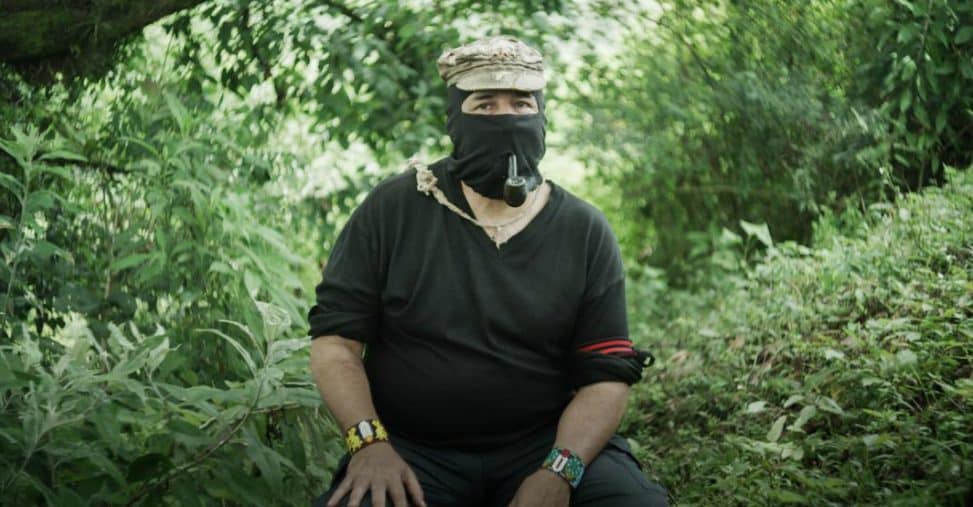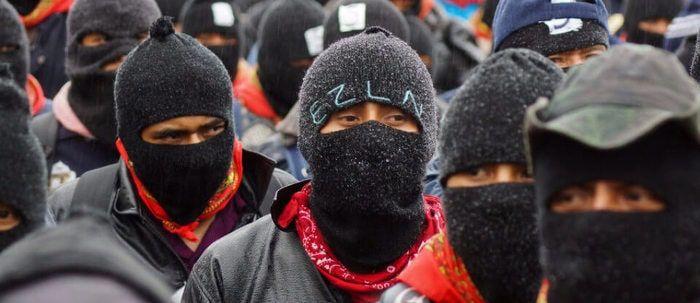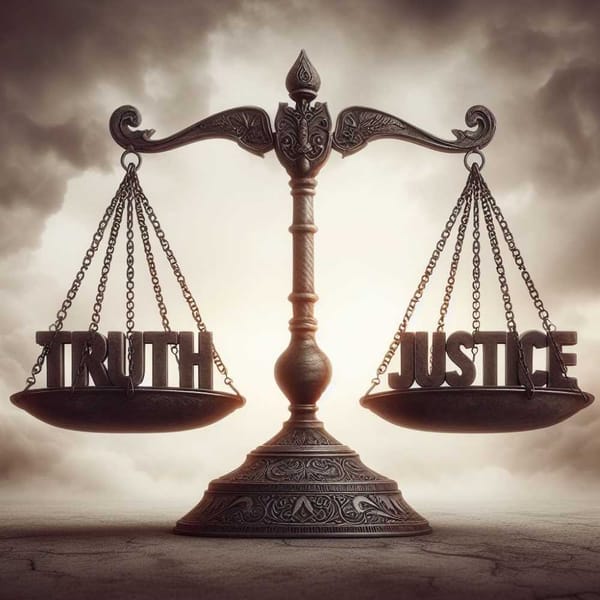Netflix documentary 1994: Power, Rebellion and Crime in Mexico
The Netflix documentary series 1994: Power, Rebellion and Crime in Mexico with 5 45-minute episodes premiered on May 17, 2019.

Netflix, the leading Internet entertainment service in the world, announced the documentary series "1994" of 5 episodes of 45 minutes, which was released on May 17, directed by Diego Enrique Osorno and produced by VICE Studios Latin America, which speaks of one of the most critical years in the modern history of Mexico and that changed the course of the country.
According to a press release, 1994 addresses the assassination of the candidate for the Presidency by the Institutional Revolutionary Party (PRI), Luis Donaldo Colosio, as a starting point to narrate the events of that year, as well as the uprising of the Zapatista Army of National Liberation (EZLN), the entry into force of the Free Trade Agreement, the end of the mandate of Carlos Salinas de Gortari, and the economic crisis known as "The error of December" with which the government of Ernesto Zedillo began."
According to a press release, 1994 addresses the assassination of the candidate for the Presidency by the Institutional Revolutionary Party (PRI), Luis Donaldo Colosio, as a starting point to narrate the events of that year, as well as the uprising of the Zapatista Army of National Liberation (EZLN), the entry into force of the Free Trade Agreement, the end of the mandate of Carlos Salinas de Gortari, and the economic crisis known as "The error of December" with which the government of Ernesto Zedillo began."
25 years away, 1994 seeks to help understand the repercussions of that year through research work, in which thousands of official and unofficial sources were reviewed. The series also has the testimonies of dozens of characters who were protagonists of the events of that year, such as Carlos Salinas de Gortari, Raul Salinas de Gortari, Luis Donaldo Colosio Riojas, Alfonso Durazo, Marcelo Ebrard, Othón Cortez, several of the prosecutors who investigated the murder of Colosio, and Subcomandante Galeano (formerly Marcos), who granted an interview before cameras for the first time since 2006, thus being the first occasion in which the rebel leader and former president Salinas give their testimony in the same documentary film.
Three keys to understanding the 1994 Netflix series
For Mexicans 1994 it represents more than a date in the calendar. It is the year that Mexico was shaken by political assassinations, the armed revolt of the Zapatista Army of National Liberation (EZLN), and the beginning of the so-called "Tequila Effect", a deep economic crisis that infected several countries.
The murder of Luis Donaldo Colosio
In 1994, the assassination of presidential candidate Luis Donaldo Colosio occurred, which according to the polls was the favorite to win the presidential election that year. Mexico is not the same after that convulsed 1994. In fact, a part of the history that now lives in the country began to be forged since then. One example is the current president Andrés Manuel López Obrador, the first leftist leader in the history of the country. AMLO, as he is known, began that year political career that, more than two decades later, led him to the presidency of Mexico.
In fact, López Obrador assures that the government of then-President Carlos Salinas de Gortari, which ended that year, was the beginning of a period of corruption and violence that prompted many of the votes of his election in 2018. It was the year of a break-in that security began to deteriorate in Mexico gradually and then spiraling. But it also revealed a crisis in the Mexican political system. It is the moment in which the regime of a hegemonic party that had governed the country after the Mexican Revolution (1910-1915) suffers a commotion. It marks the crisis of power and delineates what would come next, a very peculiar democracy in Mexico.
Part of that dramatic process is narrated in "1994", an original Netflix series and produced by Vice. The story of that year is counted from the assassination of presidential candidate Luis Donaldo Colosio on March 23 in Tijuana, a city bordering the United States. Colosio had been nominated by the ruling Institutional Revolutionary Party (PRI). At the end of a rally in the marginalized neighborhood of Lomas Taurinas, while Colosio makes his way through the crowd, a young man identified as Mario Aburto shoots him in the head. The aggressor was arrested, but the investigation into the crime did not end there.
In the following years, four prosecutors tried to solve the case that had several hypotheses: One was about the responsibility of a single aggressor, Mario Aburto Martínez. The hypothesis said that he intended to fulfill a strange mission as "Caballero Águila" (this was defined in his diaries and texts). Another thesis pointed out, instead, the operation of a supposed group to assassinate the candidate. The investigation was so unsophisticated, that 24 years later most people do not believe that Mario Aburto was responsible for the crime. But the case, which serves as the axis to the series to tell the convulsed year, is an episode in the chain of dramatic events that happened.
EZLN war on the government
On January 1, 1994, the North American Free Trade Agreement (NAFTA) entered into force, between Mexico, the United States, and Canada. But that same day the EZLN declared war on the government and attacked military installations in Chiapas. For several days there was intense fighting in the mountains and jungles of that state in the southeast of the country, but thousands of people also demanded peace in several cities. President Salinas ordered a unilateral ceasefire, and weeks later he began a dialogue with the Zapatista commander to meet their demands. But the Dialogues for Peace, as the meeting was called, were interrupted after the assassination of Colosio. The talks never resumed.

In the following months the political campaign of Ernesto Zedillo, the candidate who replaced Colosio, was based on messages to warn of risks of violence if the opposition voted. The strategy, known as "the vote of fear", worked and the PRI won the presidential election. But on September 28, the General Secretary of the party, Francisco Ruiz Massieu, was assassinated. He was a character very close to President Salinas (he was married to his sister), and was emerging as the coordinator of the deputies of his party, who were a majority in Congress. The investigation of the crime unleashed one of the biggest political scandals in recent history. Raúl Salinas de Gortari, brother of the president, was accused of the crime. Years later he was acquitted.
A deep economic crisis
1994 closed with a new military deployment of the EZLN, and a historical devaluation of the peso that unleashed a deep economic crisis. In a few days, the country lost almost all its international reserves and was on the verge of declaring itself in the suspension of payments of the debt. The impact of the so-called "Tequila Effect", as the crisis was called, was greater the following year. Thousands of people were fired, lost their property or faced the bankruptcy of their companies.
Beginning in 1995, an intense wave of irregular migration began in the United States. More than five million people left their country in the following years. In addition, one of the balances of 1994 is the current insecurity of the country. The assassination of Colosio represented a negative watershed because it revived violence as a tool of politics.
"You can only get out of the world of drug trafficking dead" Something that deepened with the poor investigation of the case. The message was "Everything is worth it, there are no limits". That generated a decomposition in all senses, in the corruption of the prosecution and justice administration apparatuses, and in the psyche of many people was the idea that everything goes". (Agustín Basave to BBC Mundo)
1994 was a watershed year for Mexico: the assassination of presidential candidate Luis Donaldo Colosio, the armed uprising of the EZLN, the beginning of a growing spiral of violence, and the worst economic crisis in its recent history. The aftermath of that dramatic episode is still the cause of suffering.




